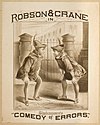The Boys from Syracuse (film)
| The Boys from Syracuse | |
|---|---|
| Directed by | A. Edward Sutherland |
| Screenplay by | Leonard Spigelgass Paul Gerard Smith Charles Grayson |
| Produced by | Jules Levey |
| Starring | Allan Jones |
| Cinematography | Joseph A. Valentine |
| Edited by | Milton Carruth |
| Music by | Charles Previn |
| Distributed by | Universal Pictures |
Release dates |
|
Running time | 73 minutes |
| Country | United States |
| Language | English |
The Boys from Syracuse is a 1940 American musical film directed by A. Edward Sutherland, based on the 1938 stage musical by Richard Rodgers and Lorenz Hart, which in turn was loosely based on the play The Comedy of Errors by William Shakespeare. The film was nominated for two Academy Awards; one for Best Visual Effects (John P. Fulton, Bernard B. Brown, Joe Lapis) and one for Best Art Direction (Jack Otterson).[3][4]
Plot
[edit]This article needs a plot summary. (January 2023) |
Cast
[edit]- Allan Jones as Antipholus of Ephesus and Antipholus of Syracuse
- Irene Hervey as Adriana
- Martha Raye as Luce
- Joe Penner as Dromio of Ephesus and Dromio of Syracuse
- Alan Mowbray as Angelo
- Charles Butterworth as Duke of Ephesus
- Rosemary Lane as Phyllis
- Samuel S. Hinds as Angeen
- Tom Dugan as Octavius
- Spencer Charters as Turnkey
- Doris Lloyd as Woman
- Larry J. Blake as Announcer
- Eddie Acuff as Taxi Cab Driver
- Matt McHugh as Bartender
- David Oliver as Messenger
- Bess Flowers as Woman
- Cyril Ring as Guard
- Julie Carter as Girl
- Eric Blore as Pinch
- William Desmond as Citizen (uncredited)
Reception
[edit]The film received mixed reviews from critics.
Bosley Crowther of The New York Times called the film "a light-weight story of mistaken identities which brushes quickly over the more intriguing implications of bedroom farce and relies in the main for its humors upon familiar low-comedy mugging and anachronistic gags. Some of them are funny—the first two or three times, anyhow ... But a lot of modern slapstick and confusion only goes so far in ancient dress—and, in this case, it isn't far enough."[5]
Variety wrote, "Sophisticated audiences will find the gags too unsubtle and the action too obvious, but the greater part of the film audience will relish the out-and-out screwiness of the whole idea."[6] Harrison's Reports wrote that the film "should, for the most part, prove satisfying to the masses, for it has plentiful gags, a few good songs, and romance."[7] Film Daily called it "packed with laughs" and "definitely timely as escapist entertainment."[8] In a review for The New Yorker, Sally Benson reported that the film had revived the stage musical "not very successfully." However, she wrote, "if you can stand seeing double, and don't mind hearing American slang in ancient Greece, and can even smile feebly over chariots equipped with taximeters, you may be able to totter out of your nearest air-cooled theater with a sultry sort of satisfaction."[9]
References
[edit]- ^ Hanson, Patricia King, ed. (1993). The American Film Institute Catalog of Motion Pictures Produced in the United States: Feature Films, 1931-1940. Berkeley and Los Angeles: University of California Press. p. 2476. ISBN 0-520-07908-6.
- ^ Croyle, Jonathan (July 18, 2016). "Syracuse goes Grecian for 'Boys from Syracuse' premiere in 1940". syracuse.com.
- ^ "The 13th Academy Awards (1941) Nominees and Winners". oscars.org. Retrieved August 12, 2011.
- ^ "NY Times: The Boys from Syracuse". Movies & TV Dept. The New York Times. 2012. Archived from the original on October 17, 2012. Retrieved December 12, 2008.
- ^ Crowther, Bosley (August 1, 1940). "Movie Review - The Boys from Syracuse". The New York Times. Retrieved November 26, 2015.
- ^ "Boys from Syracuse". Variety. New York: Variety, Inc. July 17, 1940. p. 16.
- ^ "'The Boys from Syracuse' with Allan Jones, Martha Raye and Joe Penner". Harrison's Reports: 114. July 20, 1940.
- ^ "Reviews of New Films". Film Daily. New York: Wid's Films and Film Folk, Inc.: 7 July 15, 1940.
- ^ Benson, Sally (August 10, 1940). "The Current Cinema". The New Yorker. New York: F-R Publishing Corp. p. 45.
External links
[edit]- 1940 films
- 1940 musical films
- American musical films
- American films based on plays
- American black-and-white films
- Films based on The Comedy of Errors
- Films directed by A. Edward Sutherland
- Universal Pictures films
- Films set in classical antiquity
- Films based on musicals
- Films based on adaptations
- Depictions of Augustus on film
- 1940s English-language films
- 1940s American films
- English-language musical films

